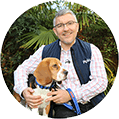The first weeks with a puppy are wonderfully exciting but many new owners can feel a little daunted by the responsibility. Here, we explore some key things to remember when it comes to feeding and exercising your new family member.
Bringing home a new puppy is a supremely joyous occasion. From thinking about all the great adventures you’ll have together to loving cuddles every day, there’s no doubt that the excitement of a new puppy is unparalleled.
However, looking after a puppy can be overwhelming, especially for new owners. There is a lot to know about taking care of your new family member, including knowing what to feed them, when to feed them and how best to exercise them.
How to feed your new puppy
Your puppy is going to grow quickly, so they need the right amount and type of food to support them. It is essential that your puppy is provided with a carefully balanced diet containing high-quality ingredients.
Opt for high-quality, commercially made food, since this has been made with the right balance of nutrients for puppies. If your puppy experiences an imbalance of nutrients in their diet, it can potentially harm their growth and development.
Feed your puppy at regular intervals (at least four times) throughout the day, and gradually reduce the number of feedings as your pet gets older. Feeding in intervals allows your puppy to get all the food they need without overstretching their stomach.
Some puppies may develop an upset stomach during the first few days in a new home. Stick with a diet that the puppy is used to and avoid offering a variety of rich foods or overfeeding during these early days.
Avoid giving your puppy too many treats, which usually contain high levels of sugar and milk products. These contribute to obesity in puppies, which can lead to health issues down the line.
It’s also best to avoid giving your puppy food from your plate or your table. Doing so encourages begging and barking, and sets them up for bad habits as they grow.
The amount each puppy needs will vary according to age, size, breed and activity levels. Ask your vet for advice on which diet will suit your puppy.
Exercising your new puppy
Regular exercise will build your puppy’s energy levels, keep their weight stable, and allow them to maintain strong, healthy cardiovascular and immune systems into adulthood.
In the first few weeks, before being fully vaccinated, your puppy will receive all the exercise they need in the house and garden. Ensure the garden is a safe, enclosed place that’s not used by any other dogs.
When your puppy is ready to start going for walks outside, take it slow to begin with. A good rule to remember is five minutes walking per puppy’s age in months. So, 20 minutes for a four-month-old, 25 minutes for a five-month-old, etc, until they’re fully grown.
Change your walking route from time to time, and let your puppy experience a variety of environments – include trips to the beach, local park and woodland, for example – and introduce a variety of activities, such as games of fetch or chase, with plenty of rewarding pats and hugs.
Don’t over-exercise your puppy
Over-exercise at an early age, particularly in some larger breeds, can lead to problems with bone development if extra care is not taken. Puppies can appear to have endless reserves of energy, but even puppies can be over-exercised.
When walking, keep an eye on the distances you cover. A dog that zigzags back and forth can cover up to five times the distance of their owner. Warning signs of too much exercise or exercise-related damage are stiffness when rising, and limping. Lots of older dogs may appear stiff when rising, but this is a bad sign in a puppy. Also, avoid letting your puppy climb the stairs or furniture and any other strenuous activity that may cause injury.
Just like a new baby, your puppy will need plenty of rest and sleep during the early stages. The new puppy should be encouraged to rest regularly.
Having a new puppy in your life is an exciting and rewarding experience. Giving them the best head start by feeding and exercising them well will ensure you and your puppy can enjoy healthy and happy lives together.
